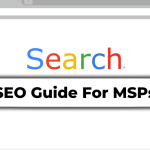If you’re like most MSPs, your marketing strategy probably overlooks one of the easiest, cheapest and most effective ways to get new clients calling you instead of the other way around: local SEO.
Now before your eyes glaze over because you think SEO is either too technical, too time-consuming or “something we tried once and it didn’t work,” let me stop you right there. Local SEO for MSPs is not some big, complicated mystery. It’s a handful of smart, tactical moves that—if done consistently—will drive inbound leads from right within your local market.
Why Local SEO Is A Goldmine For MSPs
Most MSPs compete in crowded, noisy markets where the big players are throwing money at Google Ads and dominating general SEO terms. That’s fine—let them fight over that. Where you can win is in hyper-local search results. I’m talking about when a business owner in your city searches something like “IT support near me” or “cybersecurity services in [Your City].” If you’re not showing up there, you’re invisible to the very people who are actively looking to buy from someone like you.
Local SEO helps you dominate these kinds of searches. And when done right, it brings in some of the highest-converting leads you can get—because these people are already warm, already looking and already in your area.
Step 1: Own And Optimize Your Google Business Profile
The single most powerful move you can make today is to claim and optimize your Google Business Profile (formerly Google My Business). This is what shows up in the “local pack”—those three businesses that appear on Google Maps when someone searches for services in your area.
Here’s what you need to do:
- Make sure your business info is 100% accurate. That includes your name, address, phone number, hours and website.
- Upload photos of your team, your office, your van wrap—anything that makes you look credible and professional.
- Ask for reviews. The more 5-star reviews you have, the higher your chances of getting into the top 3 of the local pack.
I’m telling you, this is an MSP SEO opportunity you can’t afford to ignore. Reviews alone can be a difference-maker. So if your clients love you, ask them to say so on Google.
Step 2: Create Location-Specific Content
If your website says “we offer IT services across the United States,” you’ve already lost the local game. Google prioritizes relevance, and if your site doesn’t mention your city or local service area, you’re not going to show up when someone searches “IT company in [Your City].”
Here’s what to do:
- Create location-specific landing pages. For example: “IT Support for Nashville Businesses” or “Cybersecurity Services in St. Louis.”
- Write blog posts that talk about common tech problems or cybersecurity threats in your area. Think: “Why Nashville Small Businesses Are Prime Targets for Phishing Attacks.”
- Sprinkle in keywords like “MSP in [City],” “IT services [City],” and “cybersecurity for small businesses in [City]” to hit those local search terms.
Step 3: Build Local Authority With Backlinks
Google wants to rank businesses that look credible—and backlinks are a key signal of that trust. If other legitimate sites are linking to your website, that’s like a vote of confidence in your favor.
Start by building links from:
- Local directories (like Yelp, Angi, and your state’s small business directory)
- Your local Chamber of Commerce
- Industry associations
- Local business partners—think accountants, VOIP providers, or web designers you already refer business to. Ask if they’d link to you in return.
This isn’t just generic SEO advice. This is SEO for MSPs—and it works.
Step 4: Make Sure Your Website Doesn’t Suck
Yes, I said it.
Because even if you do everything else right, if your website looks like it was built in 2008, takes forever to load, or isn’t mobile-friendly, Google’s not going to love you—and neither will potential clients.
Make sure:
- Your site is mobile-optimized
- It loads fast (under 3 seconds is ideal)
- You’re using clear, specific calls to action (i.e. “Book a Free Consultation”)
If you’re not sure how your site stacks up, get a professional audit done. A few technical tweaks can go a long way when it comes to MSP SEO performance.
Final Thoughts: Dominate Your Local Market Before Someone Else Does
You don’t need to master all of SEO to get results—you just need to own your own backyard first. Start small, be consistent, and stack wins where they count.
There are MSPs right now quietly raking in leads just because they showed up at the top of a local Google search. No cold calls. No fancy ads. Just smart, strategic SEO for MSPs.


